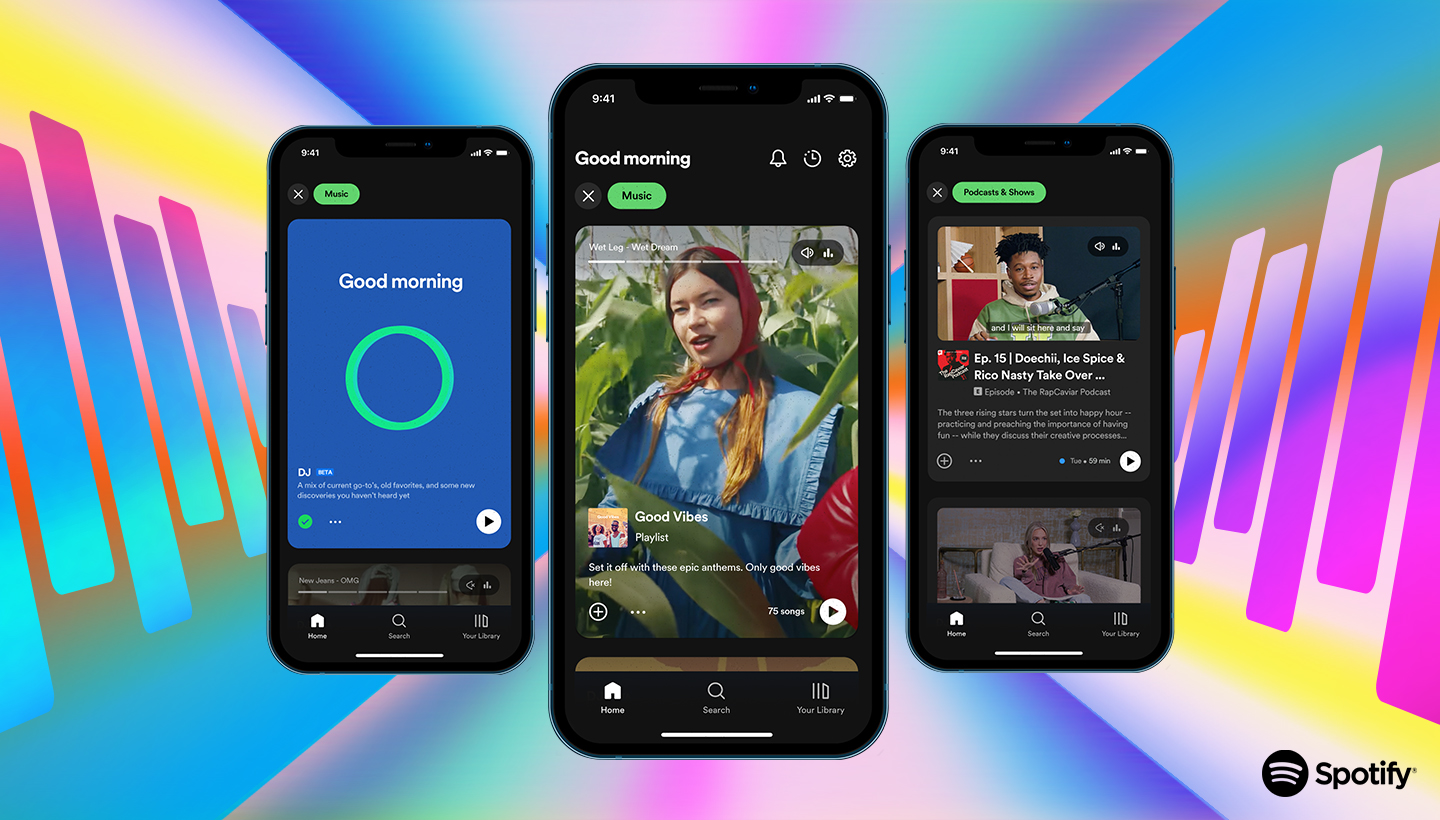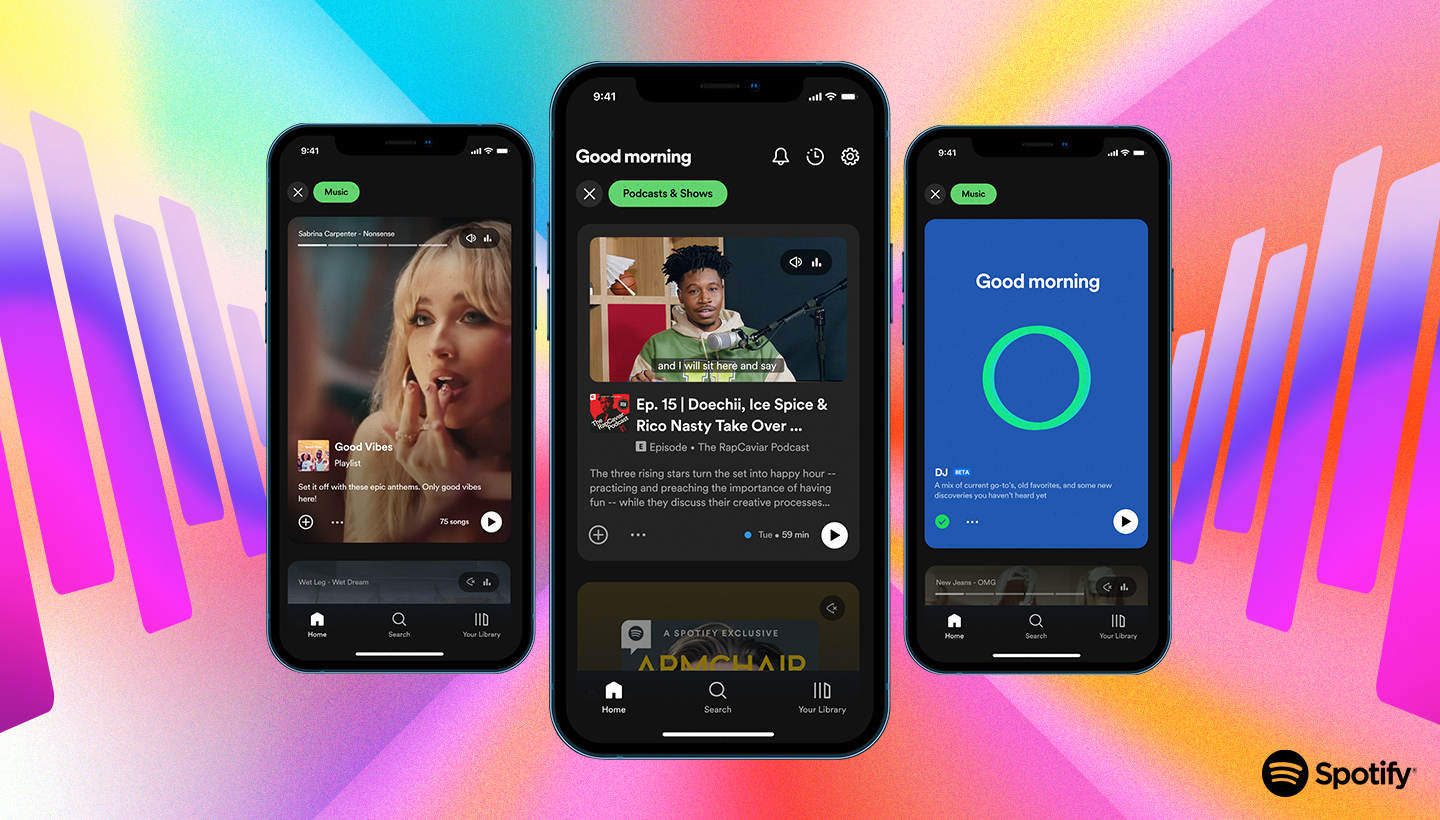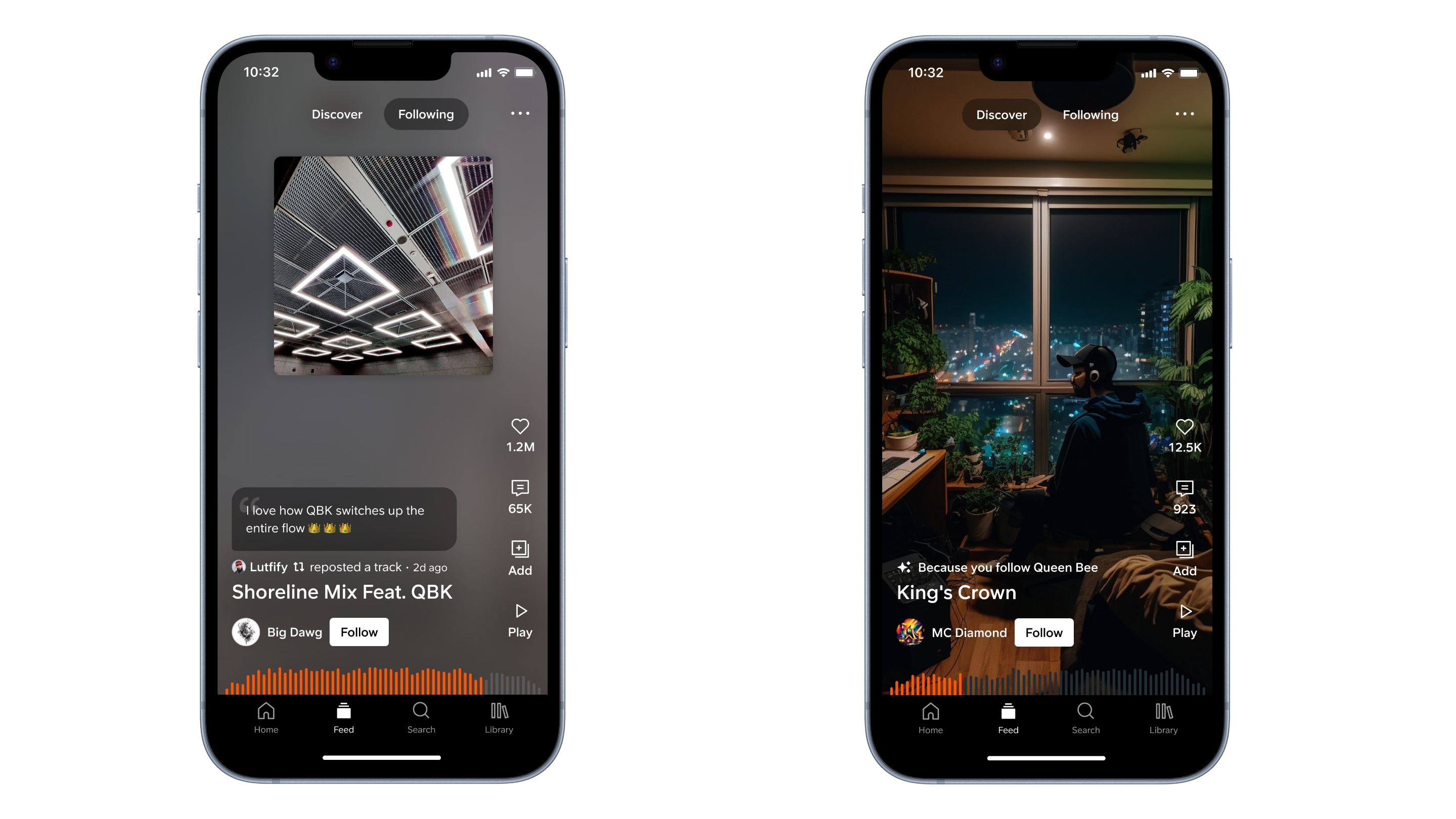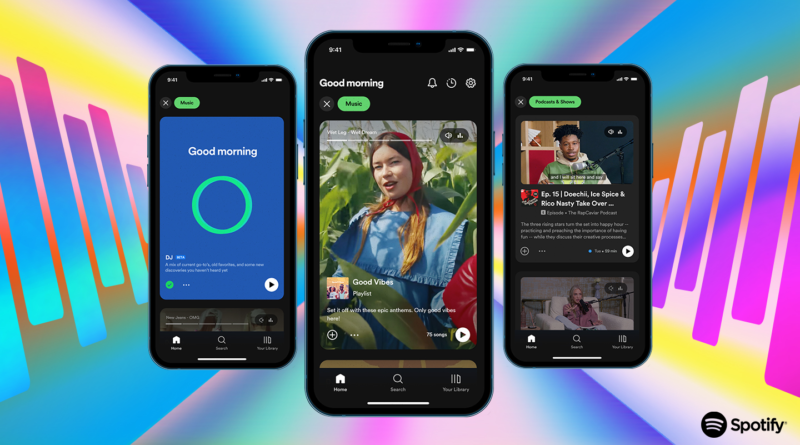This Week in Apps: TikTok-style feeds come to Spotify and Reddit; Meta’s Fediverse plans
Welcome back to This Week in Apps, the weekly TechCrunch series that recaps the latest in mobile OS news, mobile applications and the overall app economy.
The app economy in 2023 hit a few snags, as consumer spending last year dropped for the first time by 2% to $167 billion, according to data.ai’s “State of Mobile” report. However, downloads are continuing to grow, up 11% year-over-year in 2022 to reach 255 billion. Consumers are also spending more time in mobile apps than ever before. On Android devices alone, hours spent in 2022 grew 9%, reaching 4.1 trillion.
This Week in Apps offers a way to keep up with this fast-moving industry in one place with the latest from the world of apps, including news, updates, startup fundings, mergers and acquisitions, and much more.
Do you want This Week in Apps in your inbox every Saturday? Sign up here: techcrunch.com/newsletters
The TikTok-ification of consumer apps, now including Reddit and Spotify

Image Credits: Spotify
The TikTok model had already infiltrated many consumer apps — Instagram, YouTube, Snapchat, Pinterest and several more (even Netflix and Amazon!). Now you can add a handful of other high-profile apps to the list. Most notably, Spotify and Reddit this week announced their own takes on the TikTok feed with significant changes to their respective app’s designs. SoundCloud also introduced video feeds for music as a test.
For Reddit, the changes come only a year into a broader redesign. Reddit on Tuesday unveiled an updated user interface that now separates text-based content and video into separate feeds in the app, dubbed “Read” and “Watch.” The company said that, by doing so, users could switch between text-browsing — Reddit’s historical draw — to a video experience, depending on their current mood. While Reddit had tested other models for integrating video in the app before this change, this puts access to its video feed more front-and-center in the app experience.
Meanwhile, Spotify this week revealed a mobile app overhaul that introduces video-based “discovery” feeds for music, podcasts and audiobooks in an effort to engage users and reclaim some of the time spent on music discovery that had shifted over to TikTok.
What’s interesting about these latest updates is that they involve two apps that aren’t really known for video having found ways to launch their own video-based feeds as key parts of their new user experiences. While it wasn’t as much of a stretch for apps like Instagram or YouTube to adopt short-form video, Spotify and Reddit seemed less likely candidates, as they focused on other types of content, like text and audio.
But Spotify has also watched as TikTok has eaten into its market, becoming a music discovery platform so powerful that it’s now in control of the top charts. TikTok is minting new hits and artists and can even put decades-old music back into rotation when older songs get attached to a viral trend.
This is not great news for Spotify, which wants to be able to sell artists access to marketing tools to get their music found and streamed — and it wants to differentiate itself among consumers by offering better music discovery features. The company’s Discover Weekly playlist is still one of consumer tech’s best products, but it’s no longer enough to sell the service’s ability to connect fans to new music in a world where TikTok now exists.
That brings us to Spotify’s TikTok-ified revamp, which not only introduces video feeds for content discovery but also capitalizes on the format to connect users with their various interests, drilling down different types of music categories, playlists or compilations designed for specific activities. The app’s new feeds introduce video clips from artists (their short, looping Canvas videos, which already accompanied their streams), podcast video clips, podcast audio clips with a static background and animated real-time transcriptions overlaid on top, as well as clips of audiobook narrations.
The changes are radical — and potentially controversial, too.
We’ve already seen long social media threads where users announce how is the last straw — and one that will push them back to Apple Music, they lament. The general sentiment is that they don’t want a TikTok in their music app.
But Spotify’s feeds aren’t really a TikTok clone. There are no creators pushing content for likes and comments. There aren’t viral dances and challenges and trends. Its goals are increasing streams and helping people find new things to enjoy. (Well that…and helping Spotify make more money).
Arguably, a multimedia feed is a better format for serendipitous discovery than a carousel that points to albums or playlists. It’s why Netflix has trailers (even annoying autoplay ones). Hearing and seeing is simply more engaging than reading text. That can be true and users can hate it.

Image Credits: Spotify screenshot
Another key thing to note is that Spotify is also using the video feed format to not only serve as a discovery engine across formats but a starting place for connecting users to the specific type of music they want to hear now — without requiring users to type into a search box. Under the music sub-feed, the app will point you to short-form video feeds focused on various genres or even activities, like relaxing, studying or working out, for example.
This shift targets the changing consumer behavior of a younger generation (Gen Z, and soon, Alpha), which remains Spotify’s core demographic. As Google noted last year, younger people are using the web differently — and it’s a potential crisis for its own business. Speaking at an event, a Google Search exec explained how young people now often begin certain types of searches directly on Instagram and TikTok, bypassing Google Search.
Spotify, if it failed to adapt to changing trends, could have faced the same fate.
It may have seen users heading directly to TikTok to find new music, rather than its own app — no matter how many clever, personalized playlists it offered. Rather than waiting for this to be an existential threat (and one possibly accompanied by the launch of a dedicated TikTok Music app, as has been reported), it embraced the trend.
Still, it’s a big risk.
Some users weren’t necessarily thrilled with the modernized look of Google Search, now filled with colorful cards and videos instead of just a list of links. And similarly, a number of Spotify users may defect from the now video-first app to go back to more “classic” players, like Apple Music.
There’s a bit of old man yells at cloud to this early backlash, however. Internet technology is always changing as is consumer behavior. Spotify could have refused to experiment in this area, but in a way, it has a responsibility to do so as a prominent consumer app. If the changes don’t deliver the results it wants — if consumers cancel subscriptions, if engagement and discovery decline — it would likely dial things back.

Image Credits: Spotify
But if it succeeds, it would be a boon for its bottom line.
Going forward, Spotify says more artists can pay for its controversial Discovery Mode tool, which adds a signal to Spotify’s personalized algorithms — algorithms that now inform its video feeds. The feature includes paying Spotify a commission on streams. It’s not exactly an ad, but rather a tool to manipulate what feels more like an organic experience to the end user. Plus, artists can use a new feature called Showcase to place a mobile card in the new video feeds to introduce their music to potential fans. Longer-term, Spotify could insert more ads into this experience, too.
At least we’ll have to credit Spotify with this: It decided not to merely dabble with its TikTok-style features, it went all in. This is no mere add-on to its product, it’s the face of it. Unlike Reddit, which made visiting its TikTok-inspired feed a more intentional choice, Spotify’s feeds are everywhere. It’s a real test for Spotify’s brand and, as CEO Daniel Ek said at the event, the “biggest change Spotify has undergone since we introduced mobile 10 years ago.” Now the ball is in consumers’ court as to what comes next.
More from Spotify
The app’s changes were among many new features Spotify introduced at its Stream On live event in LA.
Podcasters were also pitched new tools that would give them the option to add interactive features — like Q&As and polls. These were previously reserved for Anchor creators only, but Anchor is now being merged into the larger Spotify for Podcasters dashboard. Spotify also expanded access to video podcasts, which now could hold more appeal given the new video feeds.
Artists, meanwhile, are being offered access to new tools for running campaigns, and promoting concerts and merchandise, as well as new Countdown Pages that let fans presave albums, watch exclusive videos, preorder merch, preview tracklists and watch a timer count down to a new release.
The Countdown pages can also showcase Spotify’s new Clips — under-30-second vertical videos that are uploaded directly to Spotify for Artists. These will appear on artist profiles and album pages, as well.
The feature can be used to share the story behind a song, announce an upcoming release, feature a collaborator, show off merch or, for new artists, as an introduction — or anything else an artist may want to share. Unlike on social media platforms, the goal with Clips is not to generate Likes, but rather streams of the artist’s music instead.
It’s another way Spotify is shifting its app to video outside of the TikTok-style feeds.
Corporate takeover of the Fediverse?
At the start of the week, some in the Fediverse user base were upset about Medium’s entry into their open source, decentralized space with news that Medium’s new Mastodon server would involve a fee. (It’s actually just another perk of a Medium membership.) But by the end of the week, a much bigger threat to the status quo had emerged as Meta confirmed it was working on a decentralized, text-based app. The app would effectively serve as a Twitter alternative, but also seemingly would threaten the growth of the free and decentralized web where platforms like Meta have less control.
The app, codenamed P92, would let users log in using their Instagram credentials and would support ActivityPub. The latter is concerning Fediverse advocates who fear Meta’s real interest in this space has nothing to do with their values but rather is just another example of the “embrace, extend, extinguish” approach big tech takes when there’s a threat to its power.
In the case of the Fediverse, however, there may be a tool for fighting back. Server operators could refuse to federate with any Meta-run instances, essentially carving out a space for social networking outside of big tech’s reach. Or servers could choose only to federate if Meta agreed to certain conditions, like account portability or not screwing around with ActivityPub’s development.

Image Credits: Google
- Google’s annual I/O developer conference is returning to the Shoreline Amphitheater in Mountain View on May 10. The in-person event is still more scaled-down than in pre-COVID years and the keynotes will be livestreamed. Various talks will focus on Google’s OS efforts, like Android and Wear OS.
- The second developer preview of Android 14 has shipped, offering new additions that mostly focus on added security and privacy features, rather than consumer-facing ones. One new addition is the updated photo picker which will now ask users if they want to give an app permission to access every photo or only select ones. Android 14 is also adding a credential manager as a platform API, introducing new optimizations to Android’s memory management system, and offering more personalization options to end users for various settings like temperature units and numbering systems.
- Google’s Play Console will open release tracks dedicated to Wear OS allowing developers to ship Wear OS updates independently of their core Android release.
- Google began rolling out the first Beta for the new Privacy Sandbox on Android to a small percentage of Android devices. The effort is focused on developing new technologies to enable personalized ads for mobile devices with more respect for consumer privacy.
- Android 15 will be code-named Vanilla.
Apple
- Apple’s new App Store pricing capabilities, announced in December, are now available across all app and in-app purchase types including paid apps and one-time in-app purchases, Apple announced. That means developers can now use more flexible price points and globally equalized prices. In addition, the company said on May 9, 2023, pricing for existing apps and one‑time in‑app purchases will be updated across all 175 App Store storefronts to take advantage of new enhanced global pricing.
- Apple’s Emergency SOS feature which connects users to a satellite messaging service when a cell signal is not available is now live in 12 markets, including the U.S. and Canada, after an EU expansion. Newly supported countries include Austria, Belgium, Italy, Luxembourg, The Netherlands and Portugal.
- Apple rolled out the third iOS 16.4 public beta, which includes the 31 new emoji, Safari push notifications and minor changes to first-party apps, including Podcasts and Apple Music, among other things. This will also be the last beta to require users to install a certificate — going forward, beta updates will be linked to users’ Apple IDs, instead.
- Apple released TestFlight 3.3 to its App Store. The company said it includes just stability improvements and bug fixes.
- A new consumer survey published by The WSJ (via Daring Fireball) noted that Apple is now beating Samsung in Korea in the key demographic of 18- to 29-year-olds.
Messaging
- Facebook announced it would begin testing the ability for users to access their Messenger inbox within the Facebook app. The company had separated the technologies in 2016 in a push to drive users to the standalone Messenger app.
- WhatsApp is working on a new anti-spam feature that will allow users to automatically silence incoming calls from unknown numbers.
- Telegram launched its new Power Saving Mode on iOS alongside other features. The battery saver was first announced on Mac. The feature disables animations and other effects to extend battery life and can be set to automatically turn on when the battery reaches a certain percentage. Now iOS users can also granularly adjust playback speed for videos, podcasts, voice and video messages; can view when messages were read by individual group members; can send invite links as messages; can mark all chats in a folder as read; and more.

Image Credits: Telegram
- Japanese messaging platform LINE added support for ChatGPT in its app, allowing users to send up to five messages for free per day or upgrade to unlimited messages for around $5/month. The feature was so popular it gained 200,000 users in a day.
- Discord announced a set of new AI experiences, including an update to its Clyde bot that will integrate OpenAI’s ChatGPT technology. With the release, users will be able to ask Clyde questions, have conversations or ask the bot to perform tasks, like sending you a GIF.
- Signal and WhatsApp took a stand against the Online Safety Bill in the UK, along with other secure messaging apps, all of which are refusing to undermine the encryption they use to cater to government demands.
Social
- TikTok is now blocking links to app stores from creators’ bios. The company confirmed that only business accounts would now have this ability, which even extends to include links within link-in-bio services like Linktree. While there’s no charge and no ad product involved, the move seems a push to get businesses to buy ads, rather than partnering with creators on CPI campaigns.
- Twitter had another outage this week, this time impacting images and links. Maybe they should bring back the fail whale.
- In addition to Spotify and SoundCloud, Reddit has also now adopted the TikTok-style format for its own app. The company this week launched a redesign of its app, which includes a new Watch feed for videos while another new feed, Read, will focus on text content. The company believes separating the two will allow users to more easily jump into the experience they prefer.
- In addition, Reddit said it’s closing down its Clubhouse clone, Reddit Talk. The company explained its third-party audio vendor was closing up shop and it didn’t have its own in-house resources ready.
- Meta said it will stop offering Reels bonuses to creators on Instagram and Facebook after first announcing the incentivized content program in 2021.
- An NBC News investigation found creeps and pedophiles on Pinterest, pinning images of young girls. The company said it would launch a feature that would allow users to report boards and more optioning for flagging profiles in the near-term and was planning to introduce age-verification measures at a later date.
- Gowalla, a location-based social networking app first launched in 2009, is coming back. The app is making its return just in time for SXSW (again!) to see if the time is now right for its concept to succeed. The new app has an updated look and hopes to capitalize on the void created by Snap’s shutdown of Zenly.
- Alongside the new version of its TV OS, which focuses on sports updates and live news, Roku also announced a revamp of its companion mobile app. The company described the new design as more visually immersive and said it would add features that let users access things like account management, privacy and security settings, and devices attached to their Roku account. The app will also now support up to 1,000 photos for photostreams instead of just 100. The new sports experience and “Continue Watching” rows will also be included in the update.

Image Credits: Roku
Entertainment & Streaming
- Spotify’s not the only app taking inspiration from TikTok. SoundCloud this week also introduced vertical video feeds that highlight song clips in its new TikTok-style “Discover” and “Following” feeds.
- SoundCloud also gained a new CEO: Eliah Seton, who previously oversaw Creator and Roster divisions, strategy, M&A, content partnerships, biz dev, distribution and artist partnerships. Fred Wilson, founder of Union Square Ventures and member of SoundCloud’s board since 2011, was also been appointed as the new chairman of the board.

Image Credits: SoundCloud
- TikTok gets a paywall. The company introduced a new feature called Series, which allows creators to sell Collections of up to 80 paid videos of up to 20 minutes long. Initially, creators are allowed to keep 100% of the revenue generated.
- SiriusXM announced layoffs of 475 people, or 8% of its total workforce, citing the “uncertain economic environment.” The company runs the satellite radio service as well as Pandora and Stitcher.
- Wattpad also announced layoffs of 15% of its staff (42 of 267 people), citing the economic environment.
- Sonos said it would add support for spatial audio on Apple Music on March 28, making the company the first partner to bring spatial audio into the home.
- Apple launched its Apple Music Classical app for preorder. (More on that below.)
Etc.
- Utah is allowing residents to use the GET Mobile ID app to create a digital identity which can then be used to generate a digital driving license remotely. The mobile driving license (mDL) can be used at TSA checkpoints at Salt Lake City International Airport.
- Popular widget maker and personalization app Widgetsmith announced it has now topped 100 million downloads since its launch in September 2020.
- Snoop Dogg is among the co-founders of a new app called Shiller that lets creators promote their NFTs, collect virtual tips and engage with a web3 community.
- Epic Games is now letting developers self-publish to its Epic Games Store, taking only a 12% commission on game sales and no IAP cut if they use their own payments tool.
- Microsoft’s Outlook Mac app is now free, instead of requiring a 365 subscription.

Image Credits: Microsoft
- Microsoft’s enterprise-focused Azure OpenAI service made ChatGPT available to businesses looking to add the AI model to their own apps. The Azure OpenAI service already offers other OpenAI technology, including GPT-3.5, Codex and DALL-E 2. ChatGPT is priced at $0.002 per 1,000 tokens, or about 750 words, with billing for ChatGPT usage to begin March 13. Snap has already integrated ChatGPT and others, like Instacart and Office Depot, said they will soon.
- A bipartisan group of U.S. senators introduced new legislation, the RESTRICT Act, that would allow the administration to restrict or even ban foreign technology, including TikTok if it considers the tech a national security threat. If passed, it would give the Dept. of Commerce the power to “review, prevent and mitigate” software, hardware and services from foreign adversaries.
- Meanwhile, TikTok announced Project Clover, a charm offensive focused on EU regulators that will include keeping EU user data on servers in Europe and allowing a cybersecurity audit by a European firm.
- EU regulators also asked Twitter to hire more moderators and fact-checkers, the FT said. The policymakers were worried about the company’s plan to lean on volunteers and AI for moderation.
- Irish data protection commissioner Helen Dixon said regulators were concerned about Twitter’s decision to roll out its subscription service, Twitter Blue, without notice or discussions with the DPC — a best practice, though not a legal requirement.
- Gaming startup Believer, founded by ex-Riot execs, raised $55 million from Lightspeed, a16z and others in a Series A round. The company is still being cagey about its plans — including what platforms it will support — but is focused on large, multiplayer “open world” games.
- Alongside the launch of new password manager Uno, the startup disclosed a $3 million seed round led by a16z, with participation from Lookout founder Kevin Mahaffey and Dug Song from Duo Security. The app will work on Mac, Chrome and iOS and aims to improve on the designs of other password managers with a more user-friendly experience and interface.
- Korean tech giant Kakao made a $1 billion bid to buy one-third of SM Entertainment.
- Bach, an app for planning group travel and bachelorette trips, raised $9 million in Series A funding led by Pritzker Group Venture Capital. Available on both iOS and Android, the app lets friends chat about trips, plan an itinerary, split expenses, browse curated experiences and more.
Apple Music Classical (preorder)

Image Credits: Apple
Apple announced on Thursday it will soon launch a new music streaming service focused on classical music. Based on its 2021 acquisition of Amsterdam-based streamer Primephonic, the new Apple Music Classical app will offer Apple Music subscribers access to more than 5 million classical music tracks, including new releases in high-quality audio, as well as hundreds of curated playlists, thousands of exclusive albums and other features like composer bios and deep dives on key works.
Users will be able to search by composer, work, conductor or even catalog number, to locate recordings. These can be streamed in high-quality audio of up to 192 kHz/24-bit Hi-Res Lossless. And thousands of recordings will be available in Apple’s immersive spatial audio, as well.
The service will be included with an Apple Music subscription, including Individual ($10.99/mo), Student ($5.99/mo) and Family ($16.99/mo) plans, and the Apple One bundles. At launch, it will be iOS only (iOS 15.4+) with Android to follow “soon.”
The app is available for preorder on the App Store for a March 28 release.




